How Bad Is CO2?
When I talk about global warming, I hear four main unknowns, misconceptions, and questions from people:
Are humans the main culprits of CO2 in the atmosphere?
Is CO2 causing global warming?
Are human emissions destroying the Earth?
How bad are the consequences of releasing CO2 and maybe heating the Earth?
Let’s address them!
Are CO2 Emissions Causing Global Warming?
Most people agree that humans are emitting more CO2 than ever. What they’re not sure about is whether there is global warming, and if so, whether it’s caused by CO2 emissions. They hear from the media that this is the position of climate scientists, but they don’t know what that means, so they are skeptical. So let’s look into it. First, we need to get acquainted with CO2 emissions: how much there is and where they come from.
CO2 Emissions
They make up the lion’s share of greenhouse gas emissions1.
Our yearly emissions of CO2 have grown to about 40 billion tons every year (or 40 gigatons, written 40 Gt).
If you add the impact of other greenhouse gases, we need to reduce our emissions by 55 Gt every year to stop increasing the Earth’s greenhouse effect.
So broadly keep that number in mind: About 50 Gt is our target for CO2 emissions equivalents to eliminate every year.
But that’s what we’re currently adding every year. Since we’ve been releasing a lot of CO2, growing rapidly since 1950, the accumulated amount has been building up.

Current CO2 levels are at about 420 parts per million (420 ppm2). But in the hundreds of thousands of years before today, CO2 levels never reached 300 ppm. We passed that level around 1900, and have overshot dramatically ever since.
So this is how CO2 has been accumulating in the atmosphere over the last few hundred years, with an explosion since 1950. How does this relate to global warming?
Global Warming
If we look back all the way to Roman times, we’re about 1ºC warmer now than in the pre-industrial era.
The graphs of CO2 in the atmosphere and temperatures match quite well. But correlation is not causation. Is CO2 causing global warming?
CO2 vs Global Warming
The claim is that global temperatures have increased because of human activities—mainly via greenhouse gases.
Correlation
Every time CO2 increases in the atmosphere, temperatures climb. This is for Antarctica:
So maybe most of the CO2 in the atmosphere is from natural causes, not humans?
Not really: We’ve looked into carbon in the atmosphere, and the isotopes in the atmosphere are the types commonly found in fossil fuels, not other sources3.
OK, so we know that humans are behind the new emissions of CO2, and we know that CO2 and temperatures follow each other. Would it be reasonable to conclude that humans cause global warming?
This is correlation, not causation. In fact, there’s a very straightforward way in which the causation goes in the other direction: When water is warmer, it can hold less CO2, so it releases it into the atmosphere. Warming up the oceans increases atmospheric CO2.
So is the latest temperature increase a consequence of human CO2, or the other way around? What do experts think?
Scientific Consensus
In the previous graph, we see that temperatures have varied wildly in the last 800,000 years. Here’s a more detailed graph:

You can see temperature oscillations every few tens of thousands of years. These are mostly due to the Earth’s oscillations in space. These natural shifts in the planet’s position relative to the sun cause temperatures to change wildly, more than 10ºC at a time, which would indeed release ocean CO2 into the atmosphere.
So is this just the same type of space oscillation? What do scientists think?
People believe that only about 65-70% of scientists think that global warming is caused by humans, but in fact between 96% and 100% of scientists agree, a percentage that has been growing over time4.

I sought out the skeptics, and found their best summary of evidence in the Oregon Petition. You can find the scientific summary here. I spent too much time looking into it so you don’t have to, and it reminded me of the patterns I identified when I studied conspiracy theorists: they don’t rebut the core idea of global warming or the fact that it’s man-made, but rather cherry-pick a bunch of random facts that paint a picture suggesting global warming is false. For example, the Oregon Petition selects specific time ranges and places that support their thesis5, focuses on a few weird data points6, or mixes different arguments7.
To illustrate this, I put side-by-side historic temperatures according to the scientific consensus (left) and deniers of man-made global warming (right):
The left graph suggests we’re clearly in peak temperatures. The right graph suggests we’re nowhere near. They can’t both be right.
Then consider that the left graph comes from a consortium of over 90 climate scientists, who took 7 types of samples from 32 countries. Meanwhile, the right graph comes from one data point: ocean surface temperatures of the Sargassum Sea. It shows that this region was especially warm during the Middle Ages, but when you look closer, this Medieval Warm Period was limited to the North Atlantic, where the Sargassum Sea lies.
If the best paper that anti-global warming people can muster has this poor level of evidence, while the science of global warming from human-made CO2 checks out and is backed by over 99% of climate scientists, I feel safe concluding that science overwhelmingly supports human-made global warming through CO2.
Why do experts believe CO2 levels cause these temperature increases and not exclusively the other way around?
One reason is because they’ve modeled world temperatures with everything we know, and they can’t get to current temperatures without incorporating greenhouse gas emissions. But when they add them, the models work.
The other reason is that we have a good understanding of the mechanics by which CO2 warms up the planet.
How CO2 Warms Up the Planet
The Sun emits a special set of electromagnetic rays that we call light. Most of it is in what we call the visible spectrum:
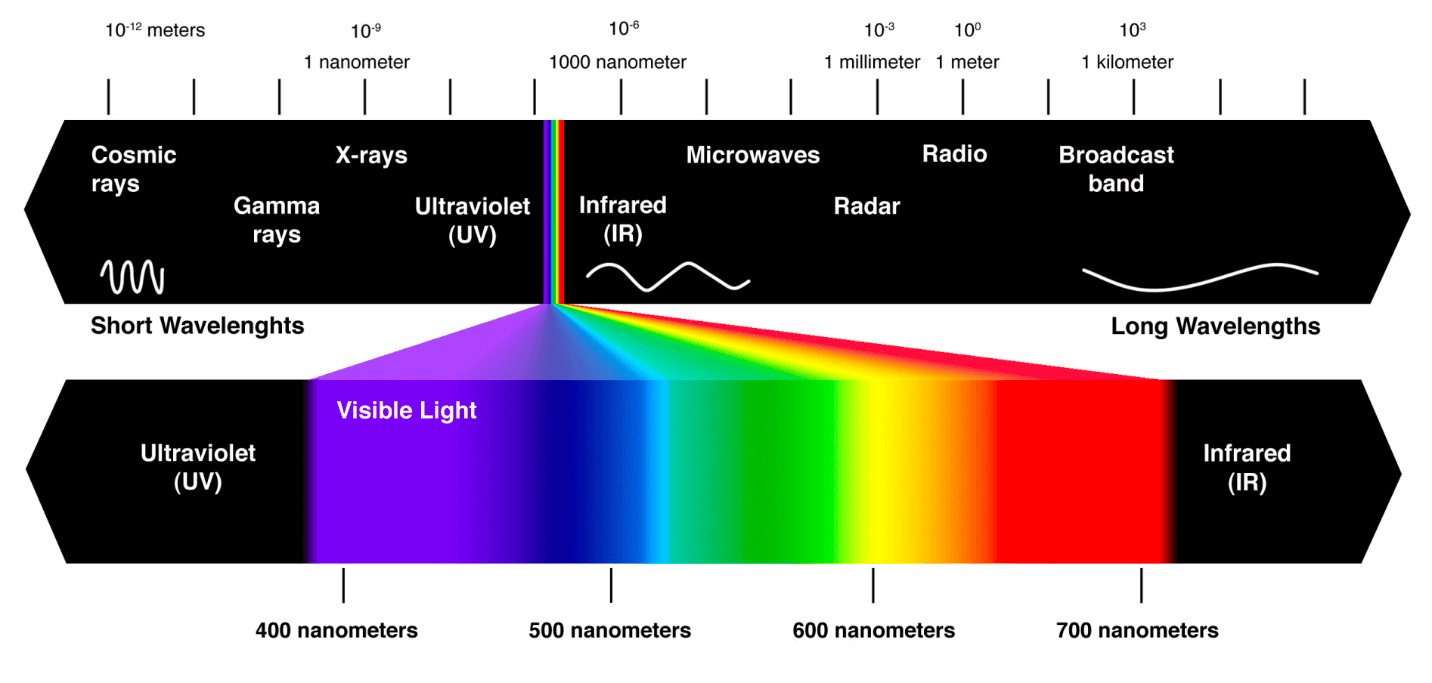
The wavelength of these electromagnetic rays is defined by the Sun’s high temperature, which is the result of the fusion of hydrogen atoms. These electromagnetic rays hit the Earth and warm it.
But the Earth also emits electromagnetic rays! Since the Earth’s temperature is much lower, however, the rays that the Earth emits are different. Their wavelength is much longer8. We call these infrared rays9.

So we have rays coming in with high energy / high frequency / short wavelength, and others leaving at a lower energy / lower frequency / longer wavelength, all due to the relative temperatures of the Sun and Earth.
Some particles in the atmosphere are good at stopping rays with wavelengths from the Sun, others are better at stopping wavelengths from the Earth. The temperature of the Earth will depend on the balance between these rays.
For each molecule, we know which wavelengths of energy they reflect, catch, or let through. Carbon dioxide (CO2), methane (CH4) and nitrous oxide (N2O) are greenhouse gases because they stop or reflect infrared light but let visible light through, which means solar light reaches the Earth and warms it up, but the rays emitted by the warm Earth are caught or reflected by the atmosphere and don’t leave. Other gases might have opposite effects, such as reflecting visible light but letting infrareds through. For example, sulfur dioxide (SO2) is a known reflector of sunlight. Just a tiny amount can cool the Earth. This is how volcanoes do it.
So here’s what we know:
We know based on the presence of carbon isotopes that humans increased the CO2 in the atmosphere by burning fossil fuels.
We know that more CO2 and higher temperatures go hand in hand.
We know that the causation goes both ways: Higher temperatures release CO2 from the oceans, and CO2 increases temperatures through the greenhouse effect. This causes a runaway effect, so when we do release CO2, temperatures can increase, further releasing more CO2.
We know CO2 increases temperatures because we’ve modeled it and, more importantly, we know exactly how the mechanism works: by capturing infrared rays while allowing solar rays through.
But maybe there are other things that cause global warming?
Other Potential Causes of Global Warming
Maybe the Sun?
No: The Sun’s radiation received by the Earth has been going down over the last 40 years, just as temperatures have been increasing.
Maybe volcanoes? They do cool down the atmosphere in the short term by releasing SO2, but since they also release CO2 that accumulates over time for a more lasting effect, maybe the net impact is warming?
Remember how we talked about the fact that we release about 40 Gt of CO2 a year? Volcanoes release 0.15 Gt of CO2 a year.
What about Earth’s orbit? We saw earlier that, in the past, it has caused the last few glaciations and warm periods. Maybe the same is happening again? In fact, the opposite is true: The Earth’s position in space suggests temperatures should be cooling down, not warming up.
So yes, humans are warming up the planet. Why is this bad?
Long-Term Perspective on CO2
If you’ve been paying attention, you’ll have noticed a few weird things.
Plant Growth
First, plants and plant equivalents10 enjoy having access to more CO2!

The more CO2 we release, the more plants consume it on land and in the ocean (things like phytoplankton, seaweed, or cyanobacteria). That’s because CO2 is a handy source of carbon that plants can grab from the atmosphere with sunlight. It looks like plants grow 20%-40% faster than before with current CO2 levels11.
The result is that projections suggest plants will keep growing faster and faster as we pump more CO2 into the atmosphere.
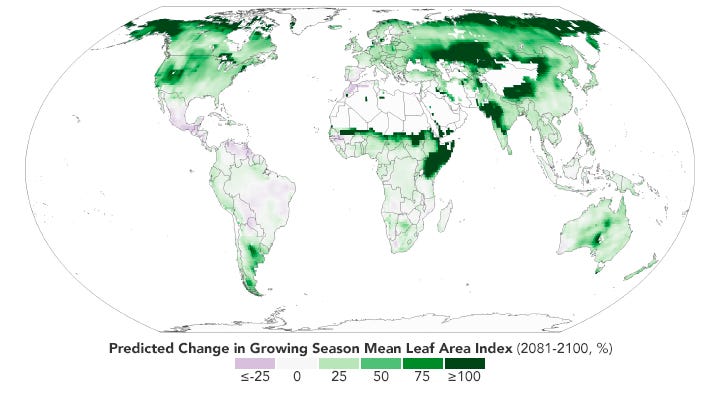
The benefits will be strongest for colder countries like Russia and Canada.
This is logical, since plants have been consuming the CO2 from the atmosphere for billions of years!
Earth Transitions
I always thought Earth was a pristine land until humans soiled it. Then I learned about the Great Oxidation Event.
There was no oxygen in the Earth for billions of years. Then plants started appearing, and they sucked in carbon from the atmosphere (in the form of CO2) to build their bodies, releasing oxygen (O2) in the process. That O2 has been building up in the atmosphere ever since.
Of course, if plants have been consuming CO2 and releasing O2 all this time, it means that CO2 has been depleted from the atmosphere for millions of years!
This graph shows the evolution of CO2 in the atmosphere:
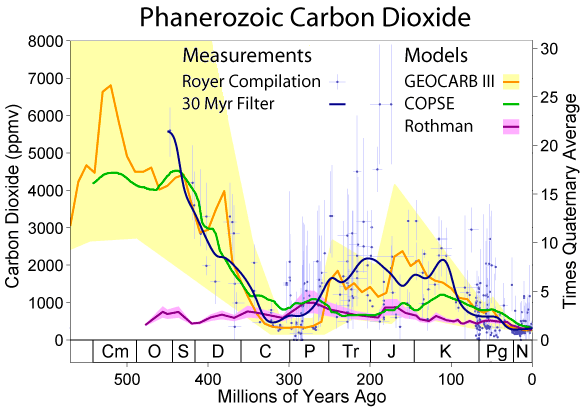
Here’s a zoom into the last 40 million years:
As you can see, in the grand scheme of things—and including today!—CO2 levels have never been as low as over the past 800,000 years.
Temperatures
Since atmospheric CO2 and global temperatures are closely related, you can imagine what the graph for temperatures looks like.

The Earth was much warmer than today for hundreds of millions of years, up until 3 million years ago, when the CO2 concentration finally fell enough for temperatures to be cooler than today most of the time. The blue oscillations are the ice ages, the last of which finished about 10k years ago. Temperature has been relatively stable ever since—until it started rising again recently. But a few hundreds of thousands of years ago we reached higher peaks, and beyond 3 millions of years ago, the Earth was always slightly warmer than today.
Now, if the Earth’s temperature keeps increasing, it will return to levels not seen for millions of years. Still, the Earth was warmer than this for hundreds of millions of years. Dinosaurs probably lived in a much hotter world12.
Also, remember that CO2 and temperatures have always been strongly correlated. And since it looks like it’s CO2 driving temperatures up rather than the other way around, it’s reasonable to assume that temperatures will go back down once we lower CO2 levels. Runaway processes might exist, but it’s unlikely that there is a tipping point after which cataclysms will be irreversible. If there are, they should take decades or centuries, way beyond human timescales. This means, as humans, we have agency.
Sea Levels
Since temperatures were much warmer before, and much colder during the last glaciations, ice caps have formed and disappeared, drastically changing sea levels throughout the Earth’s history.
If we look back millions of years, water levels were up to 400m higher. They’ve been decreasing consistently for the last 100 million years.
Just recently, about 10,000 years ago, during the last glaciation, it was the other way around: Sea levels were 120m lower.
So in summary:
CO2 levels in the atmosphere used to be much higher
Plants took advantage of this and grew faster, as they are doing today
Temperatures were commensurately much higher just a few million years ago
Sea levels have fluctuated wildly, from 200m above current levels 100 million years ago to 120m below current levels as recently as 10k years ago.
For me, the biggest surprise of all of this is that I had in mind this image of an Earth that was stable, always in equilibrium. I believed in a delicate Gaia whose body had to be protected to preserve its soul. But the Earth is not like that. It’s not a God or an animal. It’s a rock flying in space with physical and chemical processes shaping it all the time. It’s a system, and it has undergone tremendous changes over millions of years.
Throughout this time, plants and animals have come and gone. There have been periods of extinction, and periods of diversity explosion.
The Earth will be OK. The plants will be OK. The animals will be OK.
There is a tremendous loss of biodiversity happening now. And there’s a special danger now because the changes happen in a matter of decades, not thousands of years. It might be harder for a lot of animals and plants to adapt to such a sudden change. But this should be a problem we solve together, not the cause of existential panic like I had before I started looking into this a few years ago.
So for whom is CO2 bad?
Who Is CO2 Bad For?
Humans.
Hominids evolved in the last few million years, and Homo sapiens just a few hundreds of thousands of years ago. That means we’ve evolved on a planet that was cooler than it’s ever been.
Meanwhile, most of our culture evolved in just the last few thousand years, after the last glaciation that raised temperatures and sea levels dramatically. This means our culture has evolved in a world where temperatures and sea levels are as high as humans have ever experienced—but never as hot as where they’re going now.
Warmer temperatures mean more critical heatwaves13, which we are not adapted for.
Higher sea levels mean that regions we’ve inhabited for thousands of years get submerged.
If all ice melted, submerged regions would include the US East Coast, Northern Europe, and the hearts of countries like Bangladesh, India, China, Thailand, and Vietnam.

WE are at risk—along with all the other animals we’re jeopardizing alongside. But the Earth and the existence of global fauna and plants is not. We must reduce global warming not for a theoretical ideal of Mother Earth that doesn’t exist. We must reduce it to save ourselves.
So how bad is global warming for humans? What’s the most current information? The most striking data and visualizations of the topic? Who will global warming affect the most? This is what we’re going to explore in this week’s premium article.
Methane, the second greenhouse gas in terms of CO2 equivalents, has a short average life of 12 years in the atmosphere, whereas CO2 stays in the atmosphere for centuries or millennia. Therefore, CO2 really matters more than anything else, and it’s what we should be paying the most attention to. Methane comes mostly from livestock, rice cultivation, biomass burning, waste decomposition, and fossil fuel production. Nitrous oxide is primarily the result of soil fertilization.
This means that out of every million particles in the air, 420 are CO2, or 0.042%.
Fossil fuels have lots of Carbon 12 (C12) but little C13 (because plants don’t like it, so they don’t take it in as much, and when they die and become fossils, these fossils don’t contain C13) and even less C14 (this is radioactive and decays completely in the millions of years that fossil fuels are stuck in the ground). Since they have much more C12 than other sources of carbon (like volcanoes), and we’re seeing much more C12 in the atmosphere, we can conclude that CO2 comes from fossil fuels.
There are several papers on this, but the three recent ones I found all pointed in the same direction. One meta-analysis found a range of 90-100%, but most cuts to the data showed more like 96% agreement. Another meta-analysis found that around 99.5% of experts believe in global warming. The authors looked at the abstracts of a random sample of 3,000 papers since 2012 and found 4 skeptical papers, 850 papers that endorsed human-caused global warming, and 1,800 papers with no position. Then they looked at another 1,000 papers, specifically seeking skeptics, and found a total of 28 papers. 100% endorsement was found in a 2019 meta-analysis that looked into 11,602 peer-reviewed articles on “climate change” and “global warming” published in the first 7 months of 2019.
For example, citing sea temperatures (which change less than land temperatures) at some specific location and time, or focusing on a couple of decades in the middle of the 20th century when temperatures went down.
Like that glaciers started shrinking in the middle of the Industrial Revolution, not the middle of the 20th century
For example, they say that forests have been growing faster, which is true and very consistent with CO2 emissions growing, but this is not an argument against global warming; it’s an argument against it being bad for the Earth. It’s like they wanted to compile a bunch of arguments supporting CO2 emissions rather than trying to figure out whether global warming is human-made.
Longer wavelength means less energy. Imagine a very excited particle and one that isn’t excited at all. The one that is excited will move much faster, with much higher frequency, creating a much shorter wavelength.
The two extreme wavelengths we can see are violet and red (as you can see on the image above). Ultraviolets are electromagnetic rays that can be seen “beyond violet”. Infrareds are “below red”. Why “below”? Because the frequency of ultraviolets is higher and that of infrareds is lower. The frequency is the inverse of the wavelength (the longer the wavelength, the less periods you can fit in one given moment).
By “plants” I mean all plants, algae, phytoplankton, cyanobacteria… Basically everything that performs photosynthesis. These are normally called photosynthetic organisms or photoautotrophs (literally, “that feeds itself with light”), but this is confusing to most people, who understand the term “plants” better.
This is hard to tell because here we’re showing average temperatures, but it’s much harder to know local temperatures so long ago. Remember how we used ice cores to learn about the atmosphere hundreds of thousands of years ago. But these ice cores don’t even reach one million years back.
And fewer extreme cold events.


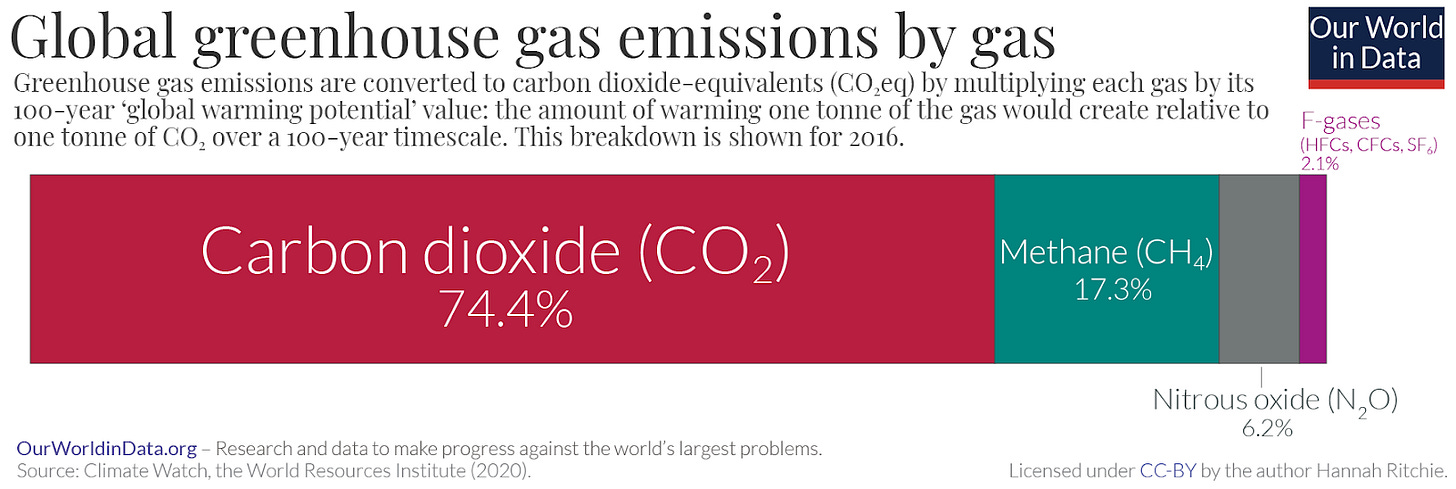








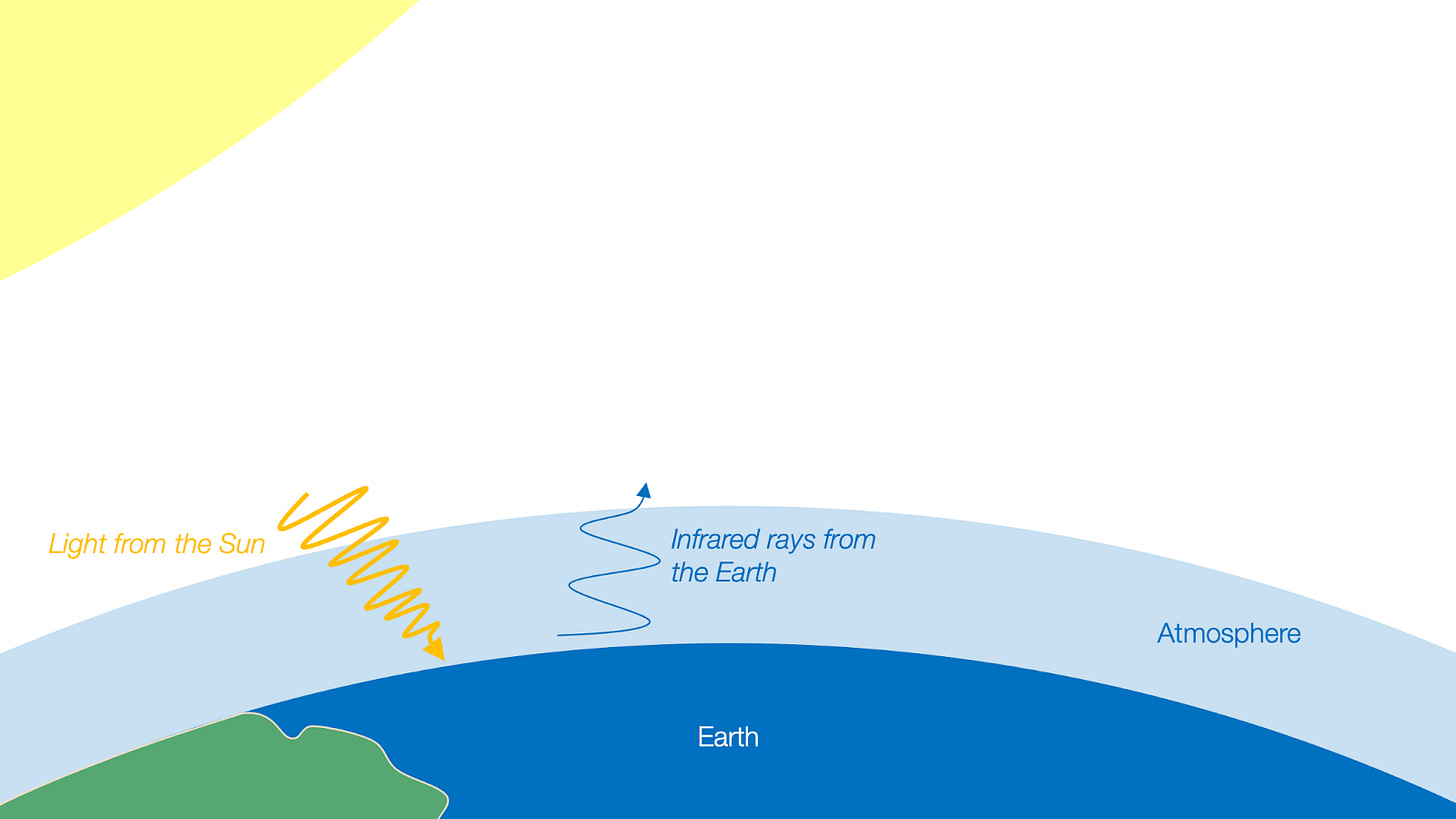








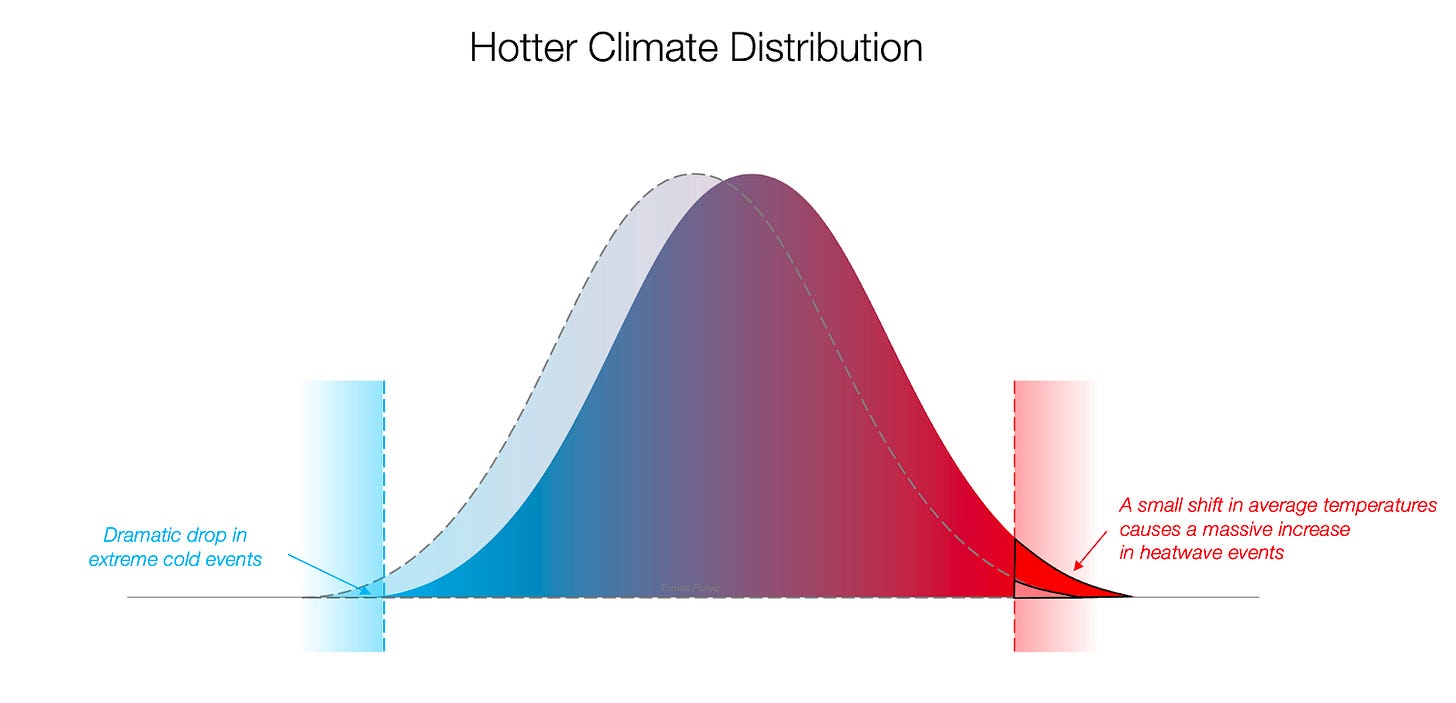

I'm a physicist with a background in nonlinear systems and climatology. Although I can endorse most of the content of this post - scientific consensus, light wavelengths, carbon sinks, etc. - the conclusion is simply not true.
Taken in the weakest sense, yes, the conclusion is correct that humans will be affected by climate change. Indeed, humans are already being affected, and have been affected in the past (for instance, by the Little Ice Age). But the implication that humanity is in trouble because of climate change is incorrect. Even presuming enormous heating, the oceanic, tundra, and particularly highland climates will remain protected. For example, even 5 degrees C warming would still leave Edinburgh comfortable for human habitation: https://en.wikipedia.org/wiki/Edinburgh
Humanity will respond to climate change through migration, shifts in agricultural production, technology, and cultural adaptation. Yes, the global climate may soon lie outside of our experience, but humans never lived in the global climate; we lived in specific climates, particularly in the subtropical range, and these will not disappear. Moreover we have always been exposed to sudden stressors from droughts, floods, storms, warfare, and the loss of food sources such as game animals. We are descended from the survivors of climate change.
So yes, global warming is an issue. And yes, given our responsibility for climate change we should take it seriously. However, it does not present nearly the same threat to humanity as other problems such as bioterrorism or the rapid development of AI. If we are concerned about the future of the human species as a whole, it is areas such as those which deserve our focus.
There is one obvious consideration here that almost everyone misses. It is not sufficient to consider only the impact that climate change has on humans. We must also consider the improvement in our ability to master our environment. Deaths from climate disasters have plummeted since we began using fossil fuels in earnest. Is it because dangerous climate events have almost disappeared? No, it’s because fossil fuels have caused unprecedented innovation by freeing up time for humans to focus on mental, rather than physical, work. Humans have never been more protected from the climate than they are today, and there is every reason to expect continued improvement.
Perhaps the premium article includes this consideration (I will consider subscribing!). Thank you for your work.